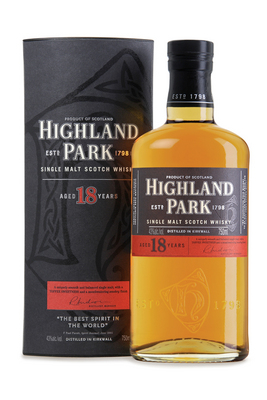|
|
Release Notes
One of our all-time favourites, this has to be one of the most consistently excellent malt whiskies of the last ten years. Showered with awards and praise from all quarters, it was named as "Best Spirit in the World" by F. Paul Pacult of the Spirit Journal in 2005. Unfailingly excellent, especially after a good meal. "Best Spirit in the World" - Spirit Journal listing the world's best 100 distilled spirits 2005. "After 25 years" experience, it fits my profile of what makes a perfect whisky, which is to say it's totally in harmony, there are no rough edges and everything is melded together brilliantly." Paul Pacult, whisky expert, 2005
The Whisky Exchange
3rd Party Tasting Notes
Nose: Warm, notably flowery. Heather-honey, fresh oak, sap, peat, smoky fragrance. Very aromatic and appetising.
Palate: Remarkably smooth, firm, rounded. Lightly salty. Leafy (vine leaves?), pine nuts. Lots of flavour development: nuts, honey, cinnamon, dryish ginger.
Finish: Spicy, very dry, oaky, smoky, hot.
Comment: If I smoked I would have a cigar with this one.
Rating: 9/10
Palate: Remarkably smooth, firm, rounded. Lightly salty. Leafy (vine leaves?), pine nuts. Lots of flavour development: nuts, honey, cinnamon, dryish ginger.
Finish: Spicy, very dry, oaky, smoky, hot.
Comment: If I smoked I would have a cigar with this one.
Rating: 9/10
Michael Jackson, Whisky Magazine #5
Nose: An empty honey jar which once held peaty embers. An enormous nose which seems to improve with each bottle I sample, though the characteristic salted butter is always present. Fabulous.
Palate: Beautifully sweet: even sweeter than the 12 Years Old with peat on the back of the palate. Beautifully chewy, oily and substantial.
Finish: Still peaty and now a little oaky. Cocoa and toffee cream compexity.
Comment: This has to be my favourite Highland Park of them all, and each new bottle I taste (this was my sixth sample) seems to underline the overall class and consistency of this distillery. Brilliant.
Rating: 9.5/10
Palate: Beautifully sweet: even sweeter than the 12 Years Old with peat on the back of the palate. Beautifully chewy, oily and substantial.
Finish: Still peaty and now a little oaky. Cocoa and toffee cream compexity.
Comment: This has to be my favourite Highland Park of them all, and each new bottle I taste (this was my sixth sample) seems to underline the overall class and consistency of this distillery. Brilliant.
Rating: 9.5/10
Jim Murray, Whisky Magazine #5
The Distillery: Highland Park
| Established: 1798 |
| Silent since: False |
| Address: Holm Road, Kirkwall, KW15, United Kingdom |
| → website |
2008 - An ultra-premium 40yo official bottling of Highland Park is released.
The people of the Highland Park distillery claim that it was founded in the year 1798. It"s wise to approach claims about historic roots in the eighteenth century with a fair dose of scepticism. Creative copywriters have been known to embellish the cold hard facts with their own brand of half truths in the past. There had been some illicit distillation going on in the area, but Highland Park didn"t obtain a license until 1826.
That"s a clever way to make collectors pay twice for the very same whisky, isn"t it? Fortunately, I"ve excorcised my own collecting demons years ago, so I was free to focus my attention on alternatives on the "budget" shelves of my liquorist. That being said, while the regular 12yo bottling has made a sharp drop in "quality" over the past decade, it"s still a very decent dram. Some older releases even fall in the "spectacular" category. The lovely touch of liquorice I found in some antique bottles seems to have vanished from Highland Park"s profile over the years, but the reward for this trade-off is perhaps an even better balanced dram.
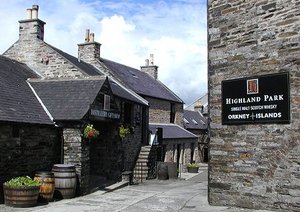
So, if you can still afford an old bottle of Highland Park single malt whisky: go for it. At least you"ll be sponsoring the Scotch whisky industry - in a way. Well, in this case I guess you"ll be mostly sponsoring Highland park"s swanky new PR agency in London; I imagine having them issue frivolous press releases on an almost daily basis will cost a pretty penny - or two... I"m not quite ready to let those pretty pennies come from MY pockets...
In 1937 Highland Park became part of Highland Distillers - who were themselves gobbled up by a 50/50 consortium of the Edrington Group and W. Grant & Sons (owners of Balvenie, Glenfiddich and Kininvie) in 1999. After they re-introduced the new Macallan range in 2004 the Edrington group focused on the upgrade of the Highland Park brand. The high quality of their regular 12 years old bottling arguably made it a little underpriced in the 1990"s, but by the time they replaced their familiar bulky bottles (depicted below) by new, sleeker bottles and packaging (depicted at the left), the HP distillery had already dropped off my top 10 of personal favourite distilleries due to ongoing price increases.
Apart from the "standard" 12 years old bottling two older expressions were released in 1997 under the previous ownership; an 18yo and a 25yo. The official range was expanded further by the new owners with a 30yo bottling in 2005 and a 40yo bottling in 2008. Apart from these regular expressions there are occasional limited releases like the HP "Ambassador"s Casks". Some of these were excellent, although there may have been some " cask fondling" going on in some cases. That"s the phrase we use to describe an unusual treatment of a cask, for example splitting a single cask into several "extra limited releases".
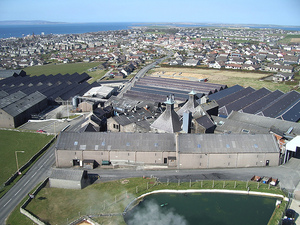
When I write this, I haven"t had the privilege of visiting the distillery on the Northern island of Orkney yet, but some other malt maniacs have. They returned with enthusiastic tales, so even though it"s a big detour if you"re visiting Edinburgh or Speyside, it seems to be worth the trip. However, if you can"t make it, here"s the history of HP in a nutshell...
In 1826 Highland Park receives a license to distill whisky. It"s also the year Robert Borwick builds the current distillery and assumes control. In 1840 Robert"s oldest son George Borwick succeeds him, but apparently this also marked the beginning of a less successful period for Highland Park. The history of Highland Park as a family business ends when George"s younger brother James Borwick inherits the distillery. Since James was a priest, his attitude towards the family trade (the distillation of spirits) was somewhat ambivalent. For a few decades there are frequent changes in ownership until James Grant (he of Glenlivet distillery) buys Highland Park. Responding to the "whisky boom" of the late 19th century, James Grant expands the number of stills from two to four in 1898. Since that time, Highland Park has operated with four stills.
In the new Millenium
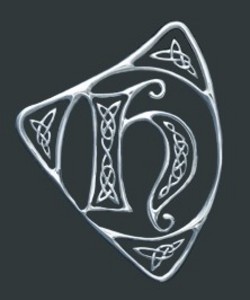
2006 - The packaging and design of the Highland Park official bottlings has remained unchanged for a decade, but a new, slightly less bulky bottle is introduced in 2006 .
2010 - Highland Park introduces new make spirit with a price tag of £20 for a 375ml bottle. That means that it"s twice as expensive as the regular 12 years old official bottling - which is a bit insulting...
Trivia:
- during WWII the mash tun served as an enormous bath for some of the 60,000 troops stationed on Orkney
- The famous HP Sauce (invented by Frederick Gibson Garton, a grocer from Nottingham) doesn"t actually contain any Highland Park whisky. You can imagine my disappointment when I discovered this fact...
- Highland Park whisky probably doesn"t include any HP sauce either...
from Malt Madness
The Owner: Highland Distillers
| Established: 1887 |
| Silent since: False |
| Address: West Kinfauns, Kinfauns, Perth PH2 7XZ, United Kingdom |
Highland Distillers was founded in 1887 by the Robertson family. In 1970 Highland purchased Matthew Gloag & Son Ltd., producers of the Famous Grouse blended whisky and acquired The Macallan single malt Scotch producers in 1996. Highland also produced the Highland Park brand whisky. Highland Distillers was purchased by the Edrington Group in 1999. William Grant & Sons and the Edrington Group took Highland Distillers private in 2000.
from Wikipedia
The Owner: Edrington Group
| Established: 1961 |
| Silent since: False |
| Address: 2500 Great Western Road, Glasgow, Scotland, G15 6RW, UK |
| → website |
The Robertson Trust bears the family name of the Robertson sisters (Elspeth, Agnes and Ethel) who had inherited the Scotch whisky interests founded and developed by their grandfather and father. Keen to ensure the on-going success of the these interests, in 1961 they brought them together under The Edrington Group (named after a farm near their home in the Scottish Borders) and established The Robertson Trust. The charitable trust is funded to a considerable degree with dividend income from The Edrington Group. The Trust gave £9,900,000 million last year to a wide variety of charitable causes.
The Robertson family was also responsible for founding Highland Distillers back in 1887 and in autumn 1999, Edrington acquired Highland along with its powerful brands The Famous Grouse, The Macallan and Highland Park. These are distributed throughout the world through a series of distribution networks and partnerships.
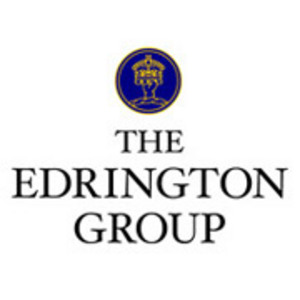
On 3 February 2010 Edrington announced that it had finalised an agreement with Berry Bros. & Rudd (BB&R), under which it will buy the Cutty Sark blended Scotch whisky brand. Under the deal, BB&R will acquire The Glenrothes single malt brand from Edrington, which has signed long-term supply agreements to provide whisky fillings and stocks to BB&R. Edrington will retain ownership of The Glenrothes distillery. The transaction will also involve Edrington acquiring all distribution contracts on Cutty Sark in force at the time of completion. The agreement is due to be concluded by April 2010.
The origins of the Group, based in Glasgow and today one of Scotland"s largest commercial companies, stretch back to the 1850"s when W.A. Robertson began business in the city. Today, Edrington is a Scottish company controlled by The Robertson Trust.

The Famous Grouse is the best selling whisky in Scotland and has held that distinction for the last 29 years. Most recently, Edrington purchased Brugal, a golden rum from the Caribbean. The purchase complements Edrington"s leading portfolio of Scotch whisky brands, and is seen as a natural fit as the Group continues to develop its core brands through premiumisation and by targeting markets with stronger growth potential.
Edrington employs over 800 people at sites across Scotland and 220 in distribution (Nordics, Taiwan and South Korea). Brugal family members continue a 120-year tradition by playing a major role in operating their business, which employs 1,100 people at its various sites across the Dominican Republic.
The Edrington Group Limited is a major Scotch whisky company (now with interests in rum) with expertise in blending, bottling, distributing and marketing. It produces several well-known brands, including The Famous Grouse, and premium malts The Macallan and Highland Park. The portfolio also includes Brugal, the leading golden rum in the Caribbean.
Trivia:
- In the New Year Honours 2008, the Edrington Group"s chair, John James Griffin Good, was made a Knight Bachelor "for services to Scotland".
- In 2010 The Edrington Group acquired the Cutty Sark blended scotch brand from Berry Bros. & Rudd.
from Wikipedia & EdringtonGroup.com
The Owner: William Grant & Sons
| Established: 1886 |
| Silent since: False |
| Address: Phoenix Crescent Strathclyde Business Park, Bellshill, Lanarkshire, ML4 3AN, UK |
| → website |
William Grant & Sons Ltd. is an independent, family-owned Scottish company which distills Scotch whisky and other selected categories of spirits. It was founded in 1886 by William Grant, and is now run by the descendants of the founder. It is the largest of the handful of Scotch whisky distillers remaining in family ownership. "William Grant & Sons" is often abbreviated to "W. Grant & Sons" or just "Grant"s", after their leading blended whisky of the same name.
William Grant & Sons pioneered single malt Scotch whisky as until Glenfiddich, only blended brands were common In 1997 the Grant entered into a joint venture with the Robertson family (The Edrington Group) creating a new company, Highland Distillers.
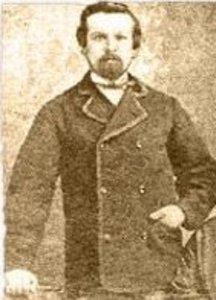
The company"s leading single malt Scotch brand is Glenfiddich, the best-selling brand in the worldwide single malt Scotch market (700,000 cases/year and 17.37% market share). This is more than the sales of the next two single malts combined. Their leading blended Scotch brand is Grant"s, the 4th best-selling brand in the worldwide blended Scotch market and the Scotch market as a whole (4 million cases/year). Grant"s is also the 4th best-selling brand in the domestic United Kingdom Scotch market (420,000 cases/year and 14.6% market share).
William Grant was born in Dufftown in 1839. The young Grant worked at Mortlach Distillery and dreamed of one day running his own distillery. He worked hard and saved and in 1886 Grant and his 9 children laid the first stone of the Glenfiddich Distillery. It was Christmas day 1887 when the first spirit ran from the stills.
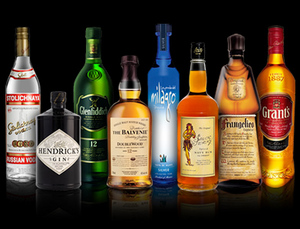
In 1892 William Grant & Sons bought a second neighbouring Distillery called Balvenie. In 1898 the two distilleries started blending their whiskies and Grant"s Whisky was "born".
The company is the 3rd largest producer of Scotch whisky (10.4% market share) after Diageo (34.4%), and Pernod Ricard. The company"s central headquarters are in Strathclyde Business Park, North Lanarkshire. Sales and marketing headquarters are in Richmond, London. The company is a member of the Scotch Whisky Association.

The master blender of Grant"s is David Stewart, who has been in his post for 47 years, the longest serving master blender with one distiller in the industry.
Core brands include: Glenfiddich, Grant"s, Balvenie, Hendrick"s Gun, Sailor Jerry Rum. Other brands include: Reyka Iclandic Vodka, Sailor Jerry Spiced Rum, Old Vatted Demerara Rum, Wood"s 100 Old Navy Rum, Vat 19 Rum, Gibson"s Finest, Clan MacGregor Blended Whisky, Monkey Shoulder Triple Malt Whisky, Taboo, Milagro Tequila, Solerno. The company also produces a number of rare whiskies such as Girvan First Batch (from 1964 casks) and Ladyburn (silent distillery closed in 1975) as well private vintage bottlings. Via Highland Distillers the company has a stake in the following brands: The Famous Grouse, The Macallan, Highland Park, Black Bottle and Gloag"s Dry Gin. The company has also co-developed Virgin Vodka with Richard Branson"s Virgin Group
The company owns several distilleries including Glenfiddich, Balvenie, Girvan Grain Distillery, Convalmore (only the bonded warehouse), Kininvie and Ailsa Bay Distillery.
Trivia:
- allegedly the first company to market Scotch whisky abroad (this claim is very contentious - there are several, particularly Glen Grant and Glenmorangie, which would dispute it)
- revolutionized bottle design in the 1950s, creating a triangular bottle
- was the first to open up its distillery to visitors
- introduced the solera concept to Glenfiddich to create Glenfiddich Solera Reserve
from Wikipedia
